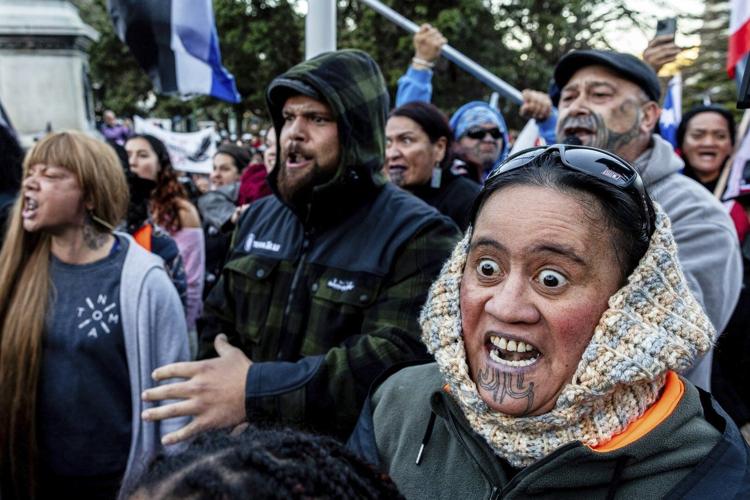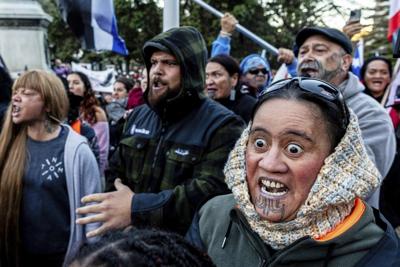WELLINGTON, New Zealand (AP) ŌĆö The haka, a chanting dance of challenge, is sacred to New ZealandŌĆÖs M─üori people but itŌĆÖs become a beloved cultural institution among New Zealanders of all races. Spine-tingling performances at sports events, funerals and graduations often go viral online, a non-partisan point of pride for the country abroad.
But one haka in New ZealandŌĆÖs Parliament by three legislators last November has provoked fierce division among lawmakers about whether it was an act of peaceful dissent, or disruptive and even intimidating to their opponents.
A vote to approve from Parliament for the M─üori party lawmakers who enacted the protest was unexpectedly suspended on Tuesday. Debate will resume in June, when it threatens to gridlock the legislative agenda until politicians from all parties reach consensus on what the punishment should be.
Hundreds of protesters against the sanctions waited outside ParliamentŌĆÖs front doors in New ZealandŌĆÖs capital, Wellington, on Tuesday to greet the M─üori party lawmakers with a haka when they emerged.
What is the haka?
The haka was once viewed as a war dance, but that understanding has changed in New Zealand as it has been embraced in a range of celebratory, somber and ceremonial settings. ItŌĆÖs an expression of M─üori identity and while sacred, it can be performed by people of any race who are educated by M─üori in the words, movements and cultural protocols.
Emotional haka have generated news headlines in the past year when performed by soldiers farewelling a New Zealander who died fighting in Ukraine, and in Paris by athletes from New ZealandŌĆÖs Olympic team. While the best-known haka is ŌĆ£ka mate,ŌĆØ the chant often performed by the All Blacks rugby team before games, there are many variants.
Why was this one controversial?
Last NovemberŌĆÖs protest wasnŌĆÖt the first time a haka has rung out in Parliament. Performances regularly follow the passage of laws important to M─üori.
But some lawmakers decried this one for two reasons: because the legislators from Te P─üti M─üori, the M─üori Party, left their seats and strode across the floor toward government politicians while performing it, and because it disrupted the vote on a proposed law.
When asked how the M─üori party would vote on a bill they said would dismantle Indigenous rights, Hana-R─üwhiti Maipi-Clarke ŌĆō New ZealandŌĆÖs youngest parliamentarian, at 22 ŌĆō tore up a copy of the law and began the haka, joined by two of her colleagues.
The law, an attempt to rewrite New ZealandŌĆÖs founding treaty between M─üori tribal leaders and the British crown, was and has . But for six months, a committee of the lawmakersŌĆÖ peers have fought furiously about how ŌĆö or whether ŌĆö their protest of it should be punished.
Why is debate about it still going?
Usually thereŌĆÖs agreement among parliamentarians about penalties for errant behavior. But this episode polarized the committee considering the lawmakersŌĆÖ actions.
Its report recommended Maipi-Clarke, who the committee said showed contrition in a letter, be suspended for seven days and her colleagues for 21 days. ThatŌĆÖs the harshest penalty ever assigned to New Zealand lawmakers; the previous record was three days.
Parliament Speaker Gerry Brownlee this month scheduled a rare, unlimited debate in Parliament until all parties could find consensus on the penalty, citing the severity of the proposed bans. But minutes after the debate began Tuesday, it was adjourned at the governmentŌĆÖs behest after they allowed the M─üori party lawmakers to stay until after ThursdayŌĆÖs budget was delivered.
It permitted the government their budget week agenda and meant the M─üori lawmakers ŌĆö opponents of the government ŌĆö wouldn’t miss one of ParliamentŌĆÖs most significant dates. But the debate about the bans will then resume.
Opposition leader Chris Hipkins, the only opponent of the sanctions to speak before debate was suspended, cited episodes where lawmakers have brawled in Parliament and driven a tractor up the buildingŌĆÖs steps, but were not suspended, as evidence that the bans werenŌĆÖt fair.
But Judith Collins, the chair of the committee that produced the sanctions, said the penalties were ŌĆ£not about the haka.ŌĆØ Collins said the lawmakersŌĆÖ behavior was the most egregious sheŌĆÖd ever witnessed.
What happens next?
The debate will resume on June 5, when it threatens to stall usual government business once more. The government said Tuesday that it would not back down from the punishments suggested and opposition parties said they couldnŌĆÖt be swayed from disputing them.
Outside Parliament, activist Eru Kapa-Kingi told the assembled crowd that the haka was ŌĆ£a source of fearŌĆØ in Parliament.
ŌĆ£Even though when the All Blacks do it itŌĆÖs a good thing,ŌĆØ he added.





















